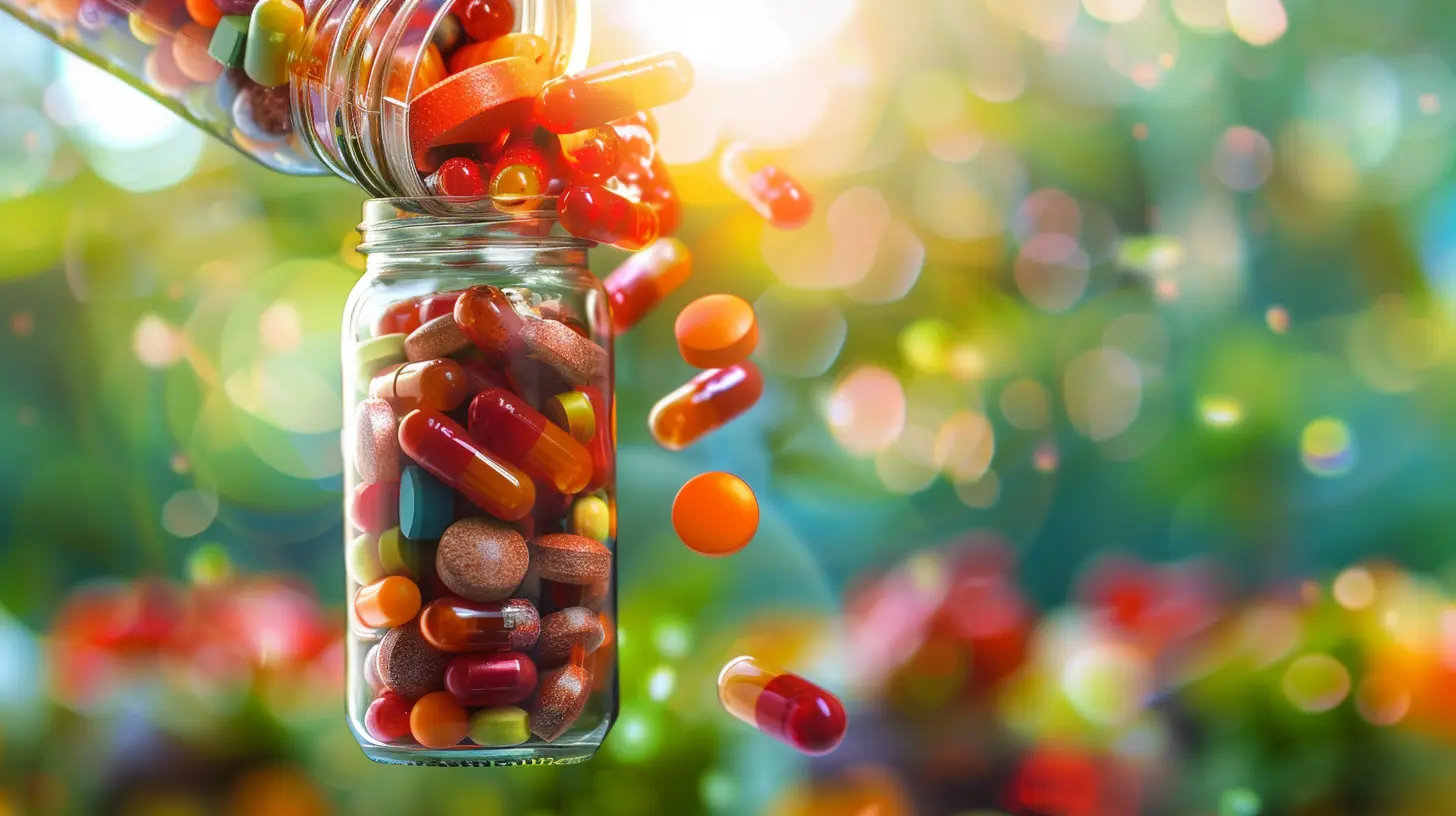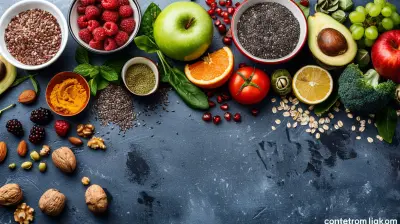How to Maximize Nutrient Absorption from Your Vitamins
11 May 2025
Let’s be honest—spending money on quality vitamins and supplements only to have your body flush most of them out isn't ideal. You want those nutrients working for you, not going down the drain (literally). So, how do you make sure your body actually absorbs all that goodness? That's exactly what this guide is about. Whether you’re a health junkie or just trying to improve your well-being, we’re going to break down the secrets to getting the most out of your vitamins.
Why Nutrient Absorption Matters
You may be taking all the right supplements, but if your body isn’t absorbing them well, you’re not reaping their benefits. Think of it like ordering an expensive meal… and then not eating it. What’s the point?Your body has to absorb vitamins effectively through the digestive system in order for them to do their job—whether that’s boosting immunity, improving energy, or supporting bone health. So, this isn’t just about what you take—it’s also about how and when you take it.
Understanding the Basics of Vitamin Absorption
Before diving into the hacks, let’s get a quick lay of the land.Water-Soluble vs. Fat-Soluble Vitamins
There are two main categories of vitamins:- Water-soluble (like Vitamin C and B-complex vitamins): These dissolve in water and get absorbed directly into the bloodstream. Since your body doesn’t store them, you need a daily supply.
- Fat-soluble (like Vitamins A, D, E, and K): These require dietary fat to be absorbed properly and are stored in the liver and fat tissues.
So, what’s the takeaway? The vitamin type dictates how you should take it. That little fact affects everything from timing to the food you eat with your supplements.
Tip #1: Take Fat-Soluble Vitamins with a Healthy Fat
Ever swallowed a multivitamin with just water? That’s a rookie mistake—at least for the fat-soluble ones.Your body needs some fat to break down and absorb vitamins like A, D, E, and K. Taking them on an empty stomach or with a fat-free meal can reduce absorption drastically.
Best pairings? A spoonful of peanut butter, some avocado, a handful of nuts, or an egg. You don’t need a greasy burger—just a light source of healthy fat will do the trick.
Tip #2: Split Your Dosage for Better Absorption
More isn't always better—especially all at once.Taking large doses of vitamins can actually overwhelm your system. Your body can only absorb a certain amount at one time, so the rest often gets excreted. That’s why splitting your dose (especially for water-soluble vitamins like Vitamin C or B12) into two or more servings throughout the day can boost absorption significantly.
Think of it like watering a plant. Pour too much at once, and it overflows. But if you slowly dose it? The plant actually benefits more.
Tip #3: Timing Is Everything
The time of day and whether you take vitamins with food play a huge role in how well they’re absorbed.When to Take:
- Morning: B-complex vitamins and Vitamin C are great in the morning. They can boost your energy and support metabolism.- With Meals: Multivitamins and fat-soluble vitamins should ideally be taken with meals so they piggyback on digestion.
- Evening: Magnesium and calcium can be better at night, as they promote relaxation and help with muscle recovery.
Be consistent. Just like a workout routine, sticking to a vitamin schedule trains your body to expect those nutrients.
Tip #4: Beware of Nutrient Competition
Some nutrients just don’t play well together. In fact, they compete for absorption and can cancel each other out.Common Culprits:
- Calcium vs. Iron: These two minerals fight for absorption. If you take them together, neither gets absorbed well. Try taking iron in the morning and calcium at night.- Zinc vs. Copper: Too much zinc can block copper absorption and vice versa. If you're supplementing both, make sure they’re balanced or taken separately.
- Magnesium and High-Fiber Foods: While fiber is healthy, too much of it can sweep magnesium and other minerals through your system before they’re absorbed.
Read labels, check your combos, and if you’re unsure—ask a healthcare pro or a knowledgeable nutritionist.
Tip #5: Support Gut Health
Here’s a big one: you can’t absorb nutrients effectively if your gut is out of whack.Your digestive system is where all the action happens. If your gut lining is inflamed, or your microbiome isn’t healthy, your vitamin game will suffer.
Gut-Boosting Tips:
- Eat fermented foods like yogurt, kefir, kimchi, or sauerkraut.- Consider a quality probiotic supplement.
- Drink enough water.
- Avoid too much sugar and processed food.
Think of your gut as the soil where your body plants all those nutrients. Better soil = better growth.
Tip #6: Choose the Right Form of the Supplement
Not all vitamins are created equal. Some are more bioavailable—aka easier for your body to absorb—than others.Better Forms to Look For:
- Methylated B12 (methylcobalamin) instead of cyanocobalamin.- Vitamin D3 rather than D2—it’s more effective.
- Chelated Minerals like magnesium glycinate or zinc picolinate absorb better than basic forms.
It might cost a little more upfront, but higher bioavailability means your body actually uses what you give it.
Tip #7: Avoid Drinking Coffee or Tea Around Supplement Time
Here’s a sneaky one. That morning cup o’ joe might be messing with your vitamins.Coffee and tea contain tannins and polyphenols that can reduce the absorption of iron and certain minerals. If you're taking iron or a multivitamin in the morning, it’s best to wait at least an hour after your coffee to pop that pill.
Just think of it this way: Let your vitamins get first dibs at the red carpet. Coffee can come in later.
Tip #8: Keep Hydrated
Water matters more than you think.Not only does it help your body process water-soluble vitamins better, but it also ensures your digestive system works properly overall. Dehydration slows everything down—including nutrient absorption.
Aim for those eight glasses a day (yes, really), especially if you're taking supplements daily.
Tip #9: Don’t Rely on Supplements Alone
Supplements are supplements for a reason—they fill gaps, but shouldn’t be your only source of nutrients.Whole foods contain co-factors and enzymes that help with vitamin absorption. For example, eating oranges gives you Vitamin C plus fiber, flavonoids, and enzymes that make the nutrient more bioavailable than in a pill form.
Food First Examples:
- Spinach for iron (paired with Vitamin C-rich foods to boost absorption)- Salmon for natural Vitamin D and omega-3s
- Eggs for B12 and choline
A balanced diet + smart supplementing = peak nutrient absorption.
Tip #10: Be Mindful of Medications
Some prescriptions can interfere with how well vitamins are absorbed.For instance:
- Antibiotics may affect gut bacteria that aid in nutrient breakdown.
- Antacids can reduce stomach acid, which is essential for absorbing minerals like magnesium, calcium, and iron.
- Cholesterol meds (statins) may deplete CoQ10 levels.
Always check with your doctor or pharmacist to make sure your meds and supplements are working together, not against each other.
Real Talk: It’s About Daily Habits
You don’t need a PhD to absorb your vitamins more effectively—you just need a bit of mindfulness.By tweaking your habits (e.g., taking vitamins with the right food, timing, form, and combinations), you let your body do what it was made to do: thrive. It’s about working smarter, not harder.
Remember, it’s not the number of supplements you take that matters—it’s how well your body uses them.
Quick Recap: Your Vitamin Absorption Checklist
✔ Take fat-soluble vitamins with healthy fats✔ Split doses throughout the day
✔ Time them right (mornings vs. evenings)
✔ Avoid bad combos (e.g. calcium + iron)
✔ Support your gut health
✔ Choose bioavailable forms
✔ Avoid coffee/tea around supplement time
✔ Stay hydrated
✔ Eat whole foods alongside supplements
✔ Check meds for absorption conflicts
Final Thoughts
Maximizing nutrient absorption from your vitamins doesn’t mean taking more—it means taking them better. Your supplements should complement your diet, not replace it. Small tweaks to your routine can make a huge difference in how you feel, function, and live.So, go ahead—be smart about your health stack. Your body will thank you for it.
all images in this post were generated using AI tools
Category:
VitaminsAuthor:

Arthur McKeever
Discussion
rate this article
3 comments
Selkie Underwood
Boost those vitamins! Your body will thank you with every bite!
May 16, 2025 at 4:08 AM

Arthur McKeever
Absolutely! Prioritizing vitamin-rich foods enhances absorption and overall health. Your body truly benefits from every nutritious choice!
Martha Allen
Great insights! Maximizing nutrient absorption is essential for overall health. Remember to pair vitamins with healthy fats and consider timing with meals for optimal results. Thanks for sharing these tips!
May 13, 2025 at 3:47 PM

Arthur McKeever
Thank you for your thoughtful comment! I'm glad you found the tips helpful. Pairing vitamins with healthy fats and meal timing are indeed key for optimal absorption.
Luna Blair
Essential tips for absorption!
May 11, 2025 at 2:37 PM

Arthur McKeever
Thank you! I'm glad you found the tips helpful. Proper absorption is key to maximizing the benefits of your vitamins!



